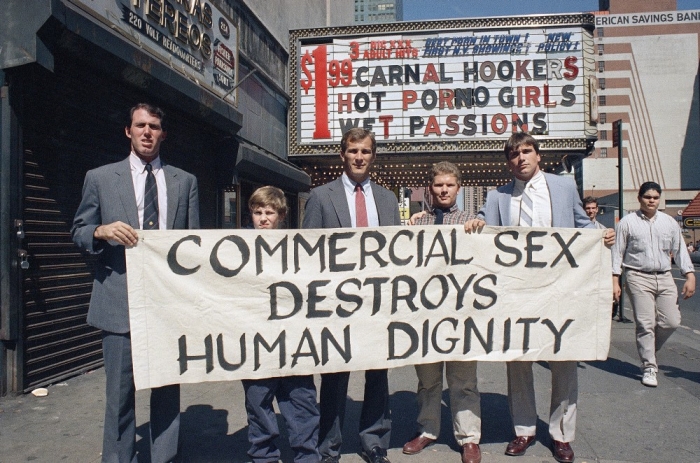The decision in American Booksellers Association v. Hudnut, 771 F.2d. 323 (7th Cir. 1985), upheld a federal district court opinion declaring unconstitutional an Indianapolis anti-pornography ordinance that made it illegal to depict women in sexually subordinate roles or positions. In so ruling, the 7th U.S. Circuit Court of Appeals found that the city ordinance violated the First Amendment.
Women’s rights advocates argued pornography demeaned women
In the early 1980s at the urging of women’s rights advocates — including Catharine MacKinnon and Andrea Dworkin, who argued that pornography sexually demeaned women — Minneapolis and some other cities contemplated ordinances or local laws to make certain forms of sexually explicit material illegal.
Proponents contended that such material violated the civil rights of women and adversely affected social attitudes towards them.
Ordinance regulated how women could be shown in pornography
Although Minneapolis decided not to adopt an ordinance, Indianapolis did, in 1984. Its law stated that any sexually explicit material that depicted women as sexual objects — interpreted as appearing to enjoy pain or humiliation, domination, or rape — and otherwise depicted them in sexually subordinate and humiliating roles would be considered a civil rights violation.
The ordinance also gave individuals who claimed to have been harmed by such depictions a right to sue the maker or seller of the pornography.
American Booksellers Association said ordinance violated First Amendment
Before the law took effect, the American Booksellers Association, an organization representing bookstores, sought an injunction in federal court to prevent the anti-pornography law from being enforced.
They argued that the ordinance violated the First Amendment free speech clause in that it censored protected expression and that its vagueness rendered the law unenforceable.
The district court issued the injunction, declaring the law unconstitutional. The decision was appealed to the Seventh Circuit.
Circuit court said pornography is protected by First Amendment
In an opinion by Judge Frank Easterbrook, the appeals court noted that the Supreme Court had ruled in Miller v. California (1973) that for material to be obscene it had to, when viewed as a whole, appeal to the “prurient interest,” contain patently offensive depictions or descriptions of specified sexual conduct, and on the whole have no “serious literary, artistic, political, or scientific value.”
Obscene material is not protected by the First Amendment and so may be proscribed. Pornographic material — so long as it fails to meet the Miller requirements — is, however, protected by the First Amendment and may not be banned. Because, according to the Court, the Indianapolis ordinance sought to regulate sexually explicit material determined not to be obscene, it was inconsistent with the Miller test.
Moreover, the court stated that under the Indianapolis ordinance, classic works by Homer and James Joyce might be considered illegal because they describe women as submissive objects for conquest and domination.
Although the court noted that the type of pornography that the ordinance sought to proscribe might in fact adversely influence how women are treated in society, the First Amendment protects all types of viewpoints, including those that describe or depict women in sexually subordinate and inferior positions.
Controversy over pornography continues
Although American Booksellers Association ended efforts to declare pornography a civil rights violation, controversy over the impact of the sexual depiction of women continues.
Some argue that pornography is not harmful and that women should be free voluntarily to participate in it, while others see it as harmful and degrading, especially when individuals are unwillingly subjected to it in the workplace. In the latter situation, the courts have often found this to be a form of sexual harassment.
This article was originally published in 2009. David Schultz is a professor in the Hamline University Departments of Political Science and Legal Studies, and a visiting professor of law at the University of Minnesota. He is a three-time Fulbright scholar and author/editor of more than 35 books and 200 articles, including several encyclopedias on the U.S. Constitution, the Supreme Court, and money, politics, and the First Amendment.

